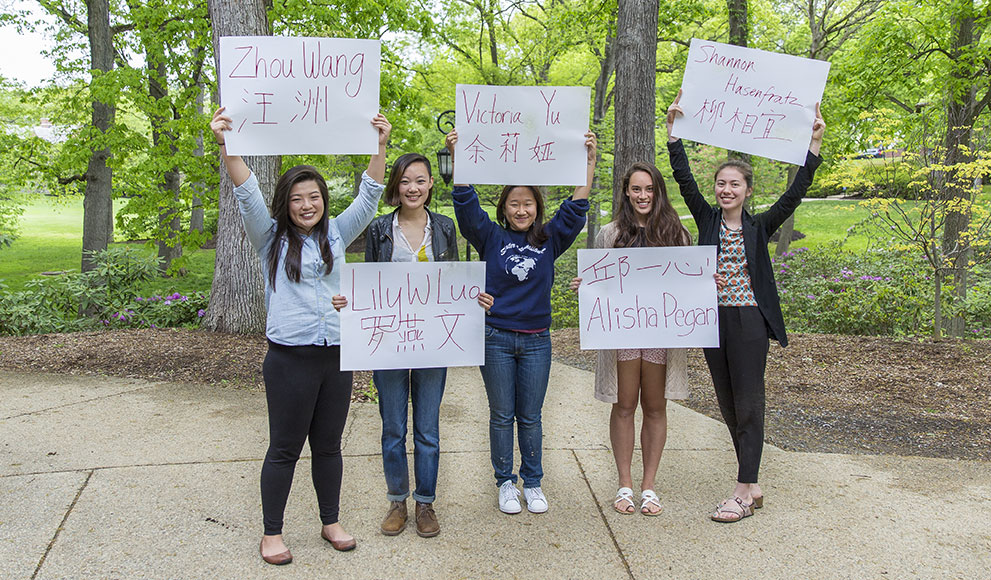Student-Led Initiative Makes Wellesley First Liberal Arts Institution to Allow Alternative Alphabets on Diplomas

At the beginning of the Fall 2015 semester, seniors were asked to submit the name they wanted to see printed on their diplomas at graduation. Some students who speak languages other than English were surprised to learn that including non-English characters was not an option.
Shannon Hasenfratz '16, whose full name includes both English letters and Chinese characters, said she assumed that printing in multiple languages would be common practice. Victoria Yu '16 said it made sense to her that Wellesley, "a school with a second-language graduation requirement, hundreds of international students, and an emphasis on diversity" should try to put the option in place.
“I am Chinese-American and after having spent so many years living in China, I am somewhat attached to my name. It's not just a name I use, but my heritage, my identity, and part of who I am,” Yu said. Yu, who is vice president of Slater International House, took the matter to the Slater Executive Board then to Student Senate.
“The request came from students at Student Senate,” said Adele Wolfson, Interim Dean of Students and Nan Walsh Schow '54 and Howard B. Schow Professor in the Physical and Natural Sciences. “It seemed like a reasonable request so I brought it to Ravi [Ravishanker, Wellesley’s Chief Information Officer] and he and the registrar's office investigated how it might be done.”
For a pilot program launched this year, the Student Life team helped identify students to participate, then faculty volunteers, and in some cases volunteers from outside of the College, were enlisted to review names. An app developed by Ravishanker's team allowed students to choose a language and gave instructions on how to type and submit the name in alternate alphabet (such as using Google Input Tools). Thirty-two students took part in the pilot with nine languages (Mandarin Chinese, Russian, Vietnamese, Hebrew, Korean, Arabic, Bengali, Hindi, and Japanese) represented.
"The diploma will have both the English and the alternate alphabet," Ravishanker explained, adding that the goal is to make this available to anyone who wishes to take advantage of the program next year. "We are the first liberal arts college to provide this service," he said.
Alisha Pegan '16, who is of Chinese and Caucasian descent and was raised in a Chinese Buddhist community said, "When I came to Wellesley, I was separated from that culture and community to a huge extent that I felt like I lost that identity...Having my Chinese name felt like I could legitimize that part of me, that my Chinese identity was part of the Wellesley journey, and that my whole self should be recognized."
Zhou Wang '16 noted that languages are a reflection of the many different cultures of Wellesley students. She came to America when she was six and said she didn't learn a lot of Mandarin characters, except her name. "It wasn't until I got to Wellesley that I started taking Chinese and learned so much about the language and the culture my family came from," Wang said.
Wang also said she thought having her name presented both ways would be meaningful to her family. She said her grandparents, who are in China, encouraged her to learn Chinese, “I wanted to make them proud when they saw my name printed in Chinese on my diploma,” she said. She also said she thought about how much her parents would appreciate her diploma and how proud they would be.
"I want to express my gratitude to the administration that made this possible," Wang said. "It takes a lot of effort to ensure that these names are printed right on such an important piece of document."
Hasenfratz called the effort meaningful because it allows her to have her full name on an official document and also, "because it means Wellesley is making strides to recognize how its diverse student body chooses to represent and identify itself."
Yu said, until the fall, she hadn't thought about what the effect having or not having her Chinese name on her diploma but that she did recognize what it could mean to others, "even if I would have been fine without it, I wanted to support my siblings and make it possible for them and anyone who would want to have this option available," she said.
